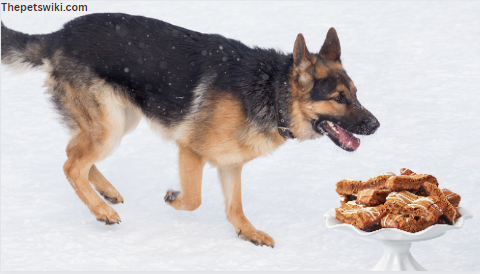We all like cookies in our daily life routine, but have you ever thought can dogs eat molasses cookies? The short answer is yes but there are a few cautions. Today we will explain all the pros and cons of molasses cookies for your pup.
What Are Molasses Cookies?
Molasses cookies are a type of sweet treat made from dough that includes molasses as a primary ingredient. Molasses, a thick, dark syrup derived from sugar cane or sugar beet juice, lends its distinct flavor to these cookies.

The dough typically consists of flour, sugar, butter or shortening, spices such as cinnamon, ginger, and cloves, and, of course, molasses. These ingredients are mixed to form a thick batter, which is then rolled into balls and flattened before baking.
How To Serve Molasses Cookies To Dogs?
When serving molasses cookies to dogs, it’s important to do so in moderation and with careful consideration of the ingredients. Here are some tips for serving molasses cookies to dogs:
- Choose Dog-Friendly Recipes: Look for recipes specifically designed for canine consumption or modify traditional human recipes to exclude ingredients that are harmful to dogs, such as chocolate, raisins, or xylitol.
- Use High-Quality Ingredients: Opt for high-quality, dog-friendly ingredients when making molasses cookies for your dog. This includes using whole wheat flour or alternative flours like coconut or oat flour, natural sweeteners such as honey or unsweetened applesauce, and spices that are safe for dogs, like cinnamon or ginger.
- Limit Serving Size: Offer molasses cookies to your dog in small portions as an occasional treat rather than a regular part of their diet. This helps prevent overconsumption of sugar and calories, which can lead to weight gain and other health issues.
- Monitor for Adverse Reactions: Keep an eye on your dog after serving them molasses cookies for any signs of digestive upset or allergic reactions. If your dog experiences vomiting, diarrhea, or other symptoms, discontinue giving them molasses cookies and consult with your veterinarian.
- Serve with Caution: While molasses cookies made with dog-friendly ingredients can be a tasty treat for your dog, it’s essential to remember that they should not replace balanced meals or be given in excess. Treats should only make up a small portion of your dog’s overall diet.
Are Molasses Treats Safe For Dogs?
Molasses treats can be safe for dogs when given in moderation and made with dog-friendly ingredients. However, it’s essential to be mindful of the ingredients used and any potential risks associated with them.
While molasses itself is not toxic to dogs, it is high in sugar and calories, which can contribute to weight gain and other health issues if consumed excessively. Additionally, some dogs may have sensitivities or allergies to certain ingredients commonly found in molasses treats, such as wheat flour or spices like cinnamon and ginger.
How Much Molasses Can a Dog Have?
The amount of molasses a dog can have depends on several factors, including the dog’s size, weight, and overall health. While molasses itself is not toxic to dogs, it is high in sugar and calories, so it’s essential to offer it in moderation.
As a general guideline, a small amount of molasses as an occasional treat is usually safe for most dogs. However, it’s crucial to consider the context in which the molasses is being given. For example, if using molasses as an ingredient in homemade dog treats, be mindful of the overall sugar content of the treats and adjust the portion size accordingly.
Risks Of Feeding Molasses Cookies To Dogs?
Feeding molasses cookies to dogs can pose several risks, primarily due to the ingredients used in the cookies. Here are some potential risks associated with feeding molasses cookies to dogs:
High Sugar Content: Molasses cookies typically contain a significant amount of sugar, which can lead to weight gain, obesity, and dental issues in dogs if consumed excessively.
Digestive Upset: Dogs may experience digestive upset, including diarrhea, vomiting, or stomach discomfort, after consuming molasses cookies, especially if they are sensitive to the ingredients or if the cookies contain high-fat or high-fiber ingredients.
Allergic Reactions: Some dogs may be allergic or sensitive to ingredients commonly found in molasses cookies, such as wheat flour, spices like cinnamon or ginger, or other additives. Allergic reactions can manifest as itching, hives, swelling, or gastrointestinal symptoms.
Caloric Intake: Molasses cookies are calorie-dense treats, and excessive consumption can contribute to an imbalance in your dog’s diet, leading to nutritional deficiencies or excess weight.
Choking Hazard: Depending on the size and texture of the cookies, there is a risk of choking or gastrointestinal blockage if dogs swallow large pieces of molasses cookies without adequately chewing them.
Toxic Ingredients: Some ingredients commonly used in molasses cookies, such as chocolate, raisins, or xylitol (a sugar substitute), can be toxic to dogs and should be avoided at all costs.
Types Of Cookies Dog Can Eat
There are several types of cookies that dogs can safely enjoy as occasional treats. These include:
Plain Peanut Butter Cookies: Made with just a few simple ingredients like peanut butter, whole wheat flour, and eggs, plain peanut butter cookies can be a tasty and protein-rich treat for dogs.
Oatmeal Cookies: Oatmeal cookies made with rolled oats, unsweetened applesauce, and a touch of cinnamon can be a wholesome and fiber-rich option for dogs.
Coconut Flour Cookies: Cookies made with coconut flour, coconut oil, and shredded coconut can provide dogs with a source of healthy fats and fiber.
Related Article: Unwrapping the Truth: Can Dogs Have Biscoff Cookies?
Summary
While dogs can technically eat molasses cookies, it’s not recommended due to several potential risks associated with the ingredients. Molasses cookies often contain high levels of sugar, which can lead to weight gain, digestive upset, and dental issues in dogs. Additionally, dogs may be sensitive or allergic to ingredients like wheat flour or spices commonly found in molasses cookies. There’s also a risk of choking or gastrointestinal blockage if dogs swallow large pieces of cookies without proper chewing. Overall, while an occasional nibble of a small, plain molasses cookie may not cause harm, it’s best to avoid feeding molasses cookies to dogs and opt for safer, dog-friendly treats instead.


